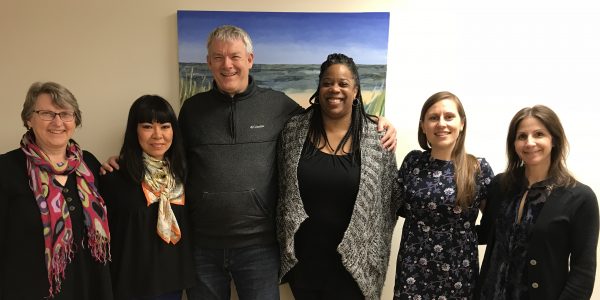VCH is focusing on our Dementia Family Caregivers
With our aging population, increasing numbers of Canadians are caring for someone with dementia. Here in B.C., 31% of those unpaid caregivers (e.g. family, friends) reported significant caregiver distress in 2017. With a vision to improve the wellbeing and increase the resilience of dementia caregivers, the VCH Older Adult Mental Health & Substance Use (OAMHSU) Program has piloted the CARERS program, in collaboration with Providence Health Care.
What is CARERS?
The CARERS program, which stands for Coaching, Advocacy, Respite, Education, Relationship, and Simulation, is an evidence-based treatment that was developed at the Reitman Center for Alzheimer’s Support and Training at Mount Sinai Hospital in Toronto. This program supports dementia caregivers by building knowledge, self-care, and caregiving skills with unique therapeutic interventions including Problem Solving Therapy and Patient Simulation. VCH OAMHSU program ran its first CARERS program for spouses and adult children of people with dementia last fall. With a very positive response from that first group, we are currently running two groups at two different sites in the community.
How does the CARERS program support dementia Caregivers?
The first half of the 10-week therapeutic group focuses on Problem Solving Therapy. Participants learn how to break down broad and often emotionally overwhelming issues into smaller parts which have practical solutions. This structured and systematic approach results in caregivers finding solutions to their problems that can be implemented right away. It builds their sense of mastery in terms of being able to use a framework that overcomes emotional overload and focuses on solvable parts of the issue.
Simulation part of the training
The second half and most novel aspect provides the opportunity for group members to learn new skills on an experiential level. Simulation is a guided re-enactment of a real and recent incident in the carer’s life. By working with a simulated patient – played by a specifically trained actor – group members have the opportunity to work through day to day issues that have to do with communication or relationship interactions. As a person with dementia loses cognitive functions including language abilities, longstanding ways of communicating between caregivers and care recipients begin to fail. This poses immense challenges for caregivers who must now learn new ways to communicate as they provide care for their family member with dementia. Simulation therapy improves communication by identifying and supporting emotional challenges and gaps in knowledge, skills, and attitudes. Often a scenario will be practiced three or four times, with the caregiver and actor giving feedback about their felt experience each time. With guidance and coaching, participants are able to learn new, more effective approaches and practice these skills within the simulation.
Supporting caregivers
There is tremendous need for Dementia Caregiver support across the continuum of care. To care for a family member with dementia, caregivers need education, effective strategies and emotional support, if they are going to develop sustainable caregiving skills (especially when they are caring for family members with complex behavioural symptoms). The CARERS program focuses on each of these elements and it has been encouraging to witness the participants hone their skills over a relatively short period of time. It helps family caregivers feel capable and empowered in their caregiving experience.
The team is grateful to VCH Community for making it possible to establish the CARERS program in Vancouver. Going forward, the hope is to offer more types of therapy programs for dementia family caregivers and to develop research ties with the Reitman Center, Providence Health Care, and UBC.
Staff can also help by identifying highly stressed caregivers in our system and encourage connection with their own GPs, as well as Alzheimer Society First Link Program. For more information please contact Staci Kalmek at 604-873-6733.

